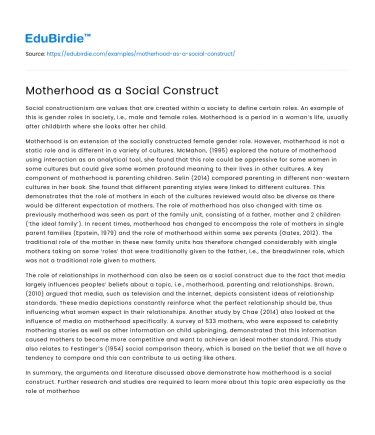Social constructionism are values that are created within a society to define certain roles. An example of this is gender roles in society, i.e., male and female roles. Motherhood is a period in a woman’s life, usually after childbirth where she looks after her child.
Motherhood is an extension of the socially constructed female gender role. However, motherhood is not a static role and is different in a variety of cultures. McMahon, (1995) explored the nature of motherhood using interaction as an analytical tool, she found that this role could be oppressive for some women in some cultures but could give some women profound meaning to their lives in other cultures. A key component of motherhood is parenting children. Selin (2014) compared parenting in different non-western cultures in her book. She found that different parenting styles were linked to different cultures. This demonstrates that the role of mothers in each of the cultures reviewed would also be diverse as there would be different expectation of mothers. The role of motherhood has also changed with time as previously motherhood was seen as part of the family unit, consisting of a father, mother and 2 children (‘the ideal family’). In recent times, motherhood has changed to encompass the role of mothers in single parent families (Epstein, 1979) and the role of motherhood within same sex parents (Gates, 2012). The traditional role of the mother in these new family units has therefore changed considerably with single mothers taking on some ‘roles’ that were traditionally given to the father, i.e., the breadwinner role, which was not a traditional role given to mothers.
Save your time!
We can take care of your essay
- Proper editing and formatting
- Free revision, title page, and bibliography
- Flexible prices and money-back guarantee
The role of relationships in motherhood can also be seen as a social construct due to the fact that media largely influences peoples’ beliefs about a topic, i.e., motherhood, parenting and relationships. Brown, (2010) argued that media, such as television and the internet, depicts consistent ideas of relationship standards. These media depictions constantly reinforce what the perfect relationship should be, thus influencing what women expect in their relationships. Another study by Chae (2014) also looked at the influence of media on motherhood specifically. A survey of 533 mothers, who were exposed to celebrity mothering stories as well as other information on child upbringing, demonstrated that this information caused mothers to become more competitive and want to achieve an ideal mother standard. This study also relates to Festinger’s (1954) social comparison theory, which is based on the belief that we all have a tendency to compare and this can contribute to us acting like others.
In summary, the arguments and literature discussed above demonstrate how motherhood is a social construct. Further research and studies are required to learn more about this topic area especially as the role of motherhood continues to change within each era.






 Stuck on your essay?
Stuck on your essay?

